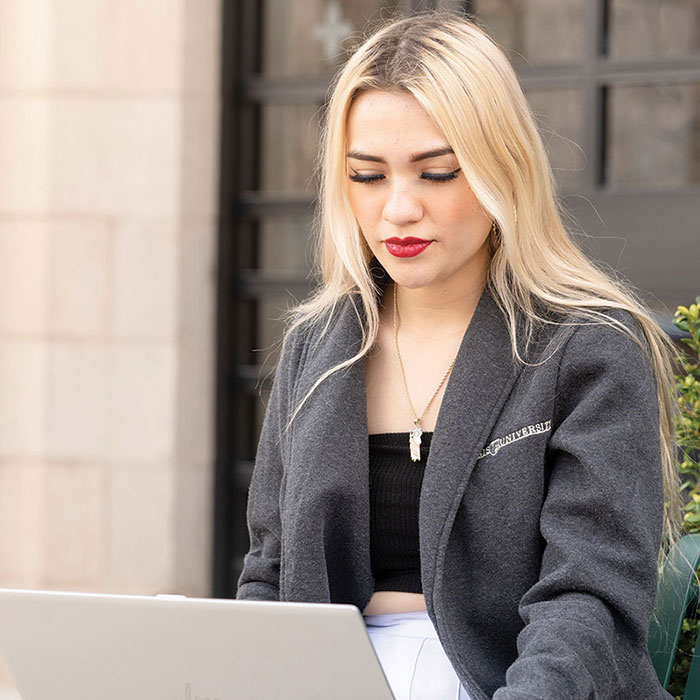Zooming with Pope Francis
Regis freshman among students chosen to talk with, and question, Pope Francis about critical issues
When she learned she was going to chat with Pope Francis, Keiry Sosa Velazquez’s first reaction was pure excitement. But as the Zoom call with the pontiff neared, the enormity of the invitation began to sink in. She was one of about a dozen students from the Americas offered an opportunity to share their concerns, suggestions and even criticisms about how the Church should address this moment’s critical issues.
No wonder Sosa Velazquez started to get nervous. She practiced in front of a mirror. She created voice memos on her phone. She timed her words down to the second.
When it was her turn to present her thoughts and questions to the leader of the Catholic Church, the Regis Freshman looked into His Holiness’ eyes through her computer screen. “My heart was racing and I was like, ‘Just speak. Just have words come out.’”
They did.
She began by reminding him, “You hold the power [of] those who feel powerless.”
She described for the Pope the idea she and fellow students devised to create a podcast for those on all sides of borders who are facing decisions to migrate, facing displacement, struggling with assimilation. “We will speak for them, not to minimize them but to build them up,” she said.
She had a few requests, too, including that no more churches be closed “as they can be transformed into our homes,” and that priests and public figures craft a discourse highlighting “that my people aren’t to be feared. They’re to be heard, understood and helped.”
The February 24 virtual dialogue, Pope Francis’ first with university students from North, South and Central America, was the unexpected result of a community project initiated by Loyola University Chicago, in response to a process launched last year by the Pope.
Loyola assembled a group of students from across the Americas and challenged them to engage in the Pope’s synodal process, which began in 2021 and continues through 2023. The Vatican describes the synodal process as a conversation with the goal of guiding the church forward on a path that allows it to better live and work its mission. In initiating the synodal process, Pope Francis specifically called for it to include those whose voices can be easily overlooked, such as refugees and migrants.
Voices like Sosa Velazquez’s. Her parents brought her to Denver from Durango, Mexico when she was an infant and she’s experienced first-hand the struggles many immigrants face, from mastering two languages to walking through life as a target for those who resent her presence here.
Because of a 2021 ruling by a U.S. District Court judge in Texas, which said the Deferred Action for Childhood Arrivals (DACA) program is unlawful, her future here is uncertain. Despite all that, Sosa Velazquez has not only persevered, but soared. The politics major is an honors student at Regis, and she’s also the recipient of the prestigious Leadership Core Scholarship.
If Sosa Vazquez has her way — and given what she’s accomplished so far, there is little reason to think she won’t — public speaking, and speaking truth to power, will become a regular occurrence in her life.
“I want to be part of Congress,” she said.
No one who knows Sosa Velazquez doubts she has a good chance of getting there.
“Keiry is a very determined young woman who has faced many challenges as an immigrant,” said Melissa Nix, Regis director of Curriculum and Intercultural Programming, and the person who recommended Sosa Velazquez be a participant in the Loyola project. “She is very passionate about her commitment to immigrant rights and very forthright in speaking to the importance of equity for all human beings, regardless of birthplace or citizenship privilege. In particular, the right to a good education is very important to Keiry.”
In fact, she’s passionate not just about education for young people, but for many others as well. “I think Americans need to be educated about immigrants and their struggles,” she said. “Americans are willing to take in refugees after war but not natural disaster or violence that’s not war-related. They assume immigrants want to take jobs, but a lot of them just want to get away from things no human should ever go through.”
Immigration and the plight of refugees was a major topic of the virtual dialogue, which Pope Francis began by calling global migration “one of the most serious problems we have to face,” and reminded the audience that he is the child of an immigrant, and that the United States is a nation of immigrants. “We must make a home for them,” he said.
For nearly two hours, students shared their views and posed difficult, often pointed, questions about how the Church is addressing, or failing to address, the issues they will face as adults.
When it was over, Sosa Vazquez said she felt hopeful that the Pope will reflect on what the students said. He made no promises, but the fact that he was taking notes throughout the dialogue could be a good sign, she said.
Sitting face to face with the Pope — albeit through a computer screen — “did bring me closer to the church,” she said. “I’ve always considered myself religious, but I do have some problems with the way the church functions. But I feel like [Pope Francis’] idea of listening to people . . . is something priests should take in. Some churches push youth away because they are so judgmental.”
